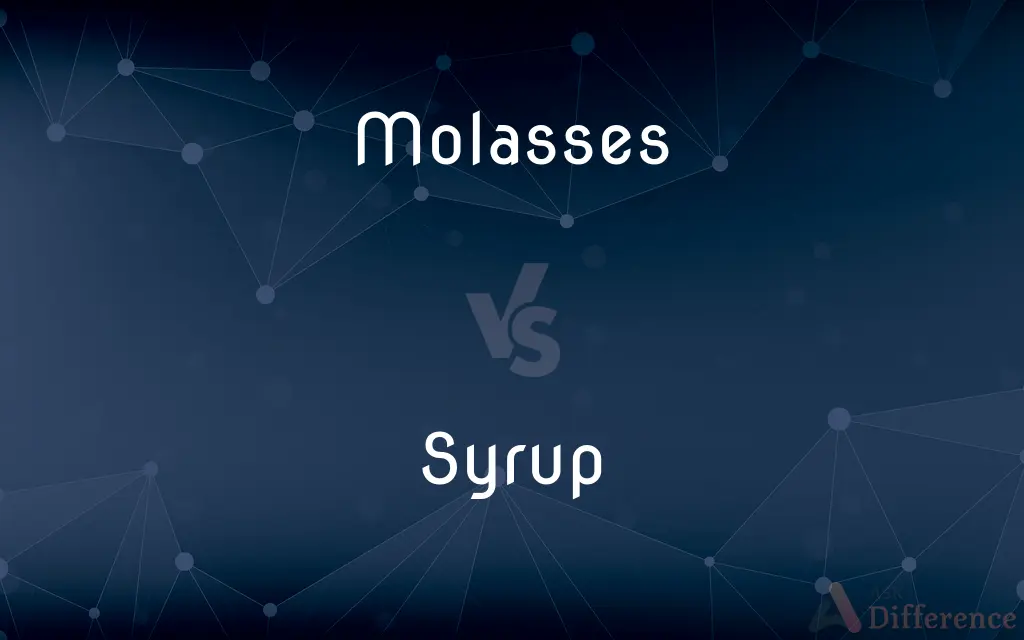Molasses vs. Syrup — What's the Difference?
By Maham Liaqat & Urooj Arif — Updated on March 13, 2024
Molasses is a thick, dark syrup produced during the sugar-making process, known for its robust flavor, whereas syrup, in a broad sense, includes any concentrated liquid sweetener.

Difference Between Molasses and Syrup
Table of Contents
ADVERTISEMENT
Key Differences
Molasses is the byproduct of refining sugarcane or sugar beets into sugar, characterized by its thick texture and deep, bittersweet flavor. While syrup is a more general term that can refer to various sweet, viscous liquids, such as maple syrup or corn syrup, which have flavors and textures depending on their source ingredients.
Molasses is rich in vitamins and minerals, such as iron, calcium, magnesium, and vitamin B6, due to the concentration of nutrients from the sugar-making process. Whereas many syrups, especially those that are commercially produced like corn syrup, are primarily sugar and water, offering fewer nutritional benefits.
The production of molasses involves boiling sugarcane or sugar beet juice and extracting sugar crystals, leaving molasses as a thick, dark residue. On the other hand, syrups can be made through various methods, including the sap extraction and boiling process for maple syrup or the mixing of sugar with water to create simple syrup.
Molasses has a strong, distinct flavor that is often described as slightly bitter or tangy, making it suitable for baking and cooking recipes that require a depth of flavor. Syrup, depending on its type, can range from the rich and complex flavor of maple syrup to the mild sweetness of light corn syrup, making each type of syrup suitable for different culinary uses.
Molasses is a key ingredient in recipes like gingerbread, barbecue sauces, and marinades, offering a unique flavor profile. Syrup, however, is versatile in its use, serving as a sweetener for pancakes, waffles, and oatmeal, as well as a component in baking and beverages.
ADVERTISEMENT
Comparison Chart
Source
Byproduct of sugar cane or beet processing
Various, including corn, maple, and fruits
Flavor
Robust, bittersweet
Varies, generally sweet
Nutritional Value
High in vitamins and minerals
Generally lower, varies by type
Texture
Thick and sticky
Ranges from light to thick
Culinary Uses
Baking, sauces, marinades
Sweetening, baking, toppings
Compare with Definitions
Molasses
Rich in minerals like iron and calcium.
Molasses can be a nutritional addition to recipes.
Syrup
A concentrated liquid sweetener from various sources.
Maple syrup is made from the sap of maple trees.
Molasses
Known for its strong, bittersweet taste.
The recipe calls for molasses to enhance the gingerbread's depth.
Syrup
Used widely in desserts and breakfasts.
Syrup is a favorite topping for pancakes and waffles.
Molasses
Common in savory dishes and baking.
A tablespoon of molasses gives a smoky flavor to barbecue sauce.
Syrup
Can be made from fruits, grains, or plants.
Blueberry syrup is made by reducing blueberry juice with sugar.
Molasses
A thick, dark liquid made during the sugar refining process.
Molasses is often used in baking for its rich flavor.
Syrup
Varies in nutritional value.
Pure maple syrup contains antioxidants and minerals.
Molasses
Byproduct of sugar production.
Molasses is created from the residue left after sugar crystals are extracted.
Syrup
Ranges in flavor and texture.
Corn syrup is a light, sweet syrup used in candy making.
Molasses
Molasses () or black treacle (British English) is a viscous substance resulting from refining sugarcane or sugar beets into sugar. Molasses varies by the amount of sugar, method of extraction, and age of plant.
Syrup
In cooking, a syrup or sirup (from Arabic: شراب; sharāb, beverage, wine and Latin: sirupus) is a condiment that is a thick, viscous liquid consisting primarily of a solution of sugar in water, containing a large amount of dissolved sugars but showing little tendency to deposit crystals. Its consistency is similar to that of molasses.
Molasses
A thick syrup produced in refining raw sugar and ranging from light to dark brown in color.
Syrup
A thick, sweet liquid made by dissolving sugar in boiling water, often used for preserving fruit.
Molasses
Any of various thick syrups made from juice extracted from the fruits or stalks of certain plants
Pomegranate molasses.
Syrup
A wig
He has been bald for the past twenty years, his shame concealed by a syrup of some opulence
Molasses
A thick, sweet syrup drained from sugarcane, especially (North America) the still thicker and sweeter syrup produced by boiling down raw molasses.
Syrup
A thick, sweet, sticky liquid, consisting of a sugar base, natural or artificial flavorings, and water.
Molasses
(US) Any similarly thick and sweet syrup produced by boiling down fruit juices, tree saps, etc., especially concentrated maple syrup.
Syrup
A thick, sugary liquid made by boiling down or otherwise concentrating plant sap, juice, or grain extracts.
Molasses
(figurative) Anything considered figuratively sweet, especially sweet words.
He really poured on the molasses, charming his audience and changing more than a few votes.
Syrup
A concentrated solution of sugar in water, often used as a vehicle for medicine.
Molasses
Plural of molass: whiskey made from molasses.
Syrup
Any thick liquid that has a high sugar content and which is added to or poured over food as a flavouring.
Maple syrup
Pancake syrup
Peaches in syrup
Molasses
Synonym of molass: whiskey made from molasses.
Syrup
(by extension) Any viscous liquid.
Cough syrup
Molasses
(geology) molasse
Syrup
A wig.
Molasses
(obsolete) molass: becomes drunk from molass.
Syrup
(transitive) To convert or process into syrup.
Molasses
The thick, brown or dark colored, viscid, uncrystallizable sirup which drains from sugar, in the process of manufacture; any thick, viscid, sweet sirup made from vegetable juice or sap, as of the sorghum or maple. See Treacle.
Syrup
(transitive) To add syrup to.
Molasses
Thick dark syrup produced by boiling down juice from sugar cane; especially during sugar refining
Syrup
(transitive) To sabotage (a vehicle) by pouring syrup into the gas tank.
Syrup
Same as Sirup, Sirupy.
Syrup
A thick sweet sticky liquid
Common Curiosities
Can molasses and syrup be used interchangeably in recipes?
While they can sometimes be substituted for each other, the unique flavors and textures of molasses and syrup mean they're best used in recipes that specifically call for them.
What are the nutritional benefits of molasses?
Molasses is rich in vitamins and minerals, such as iron, calcium, and vitamin B6.
How is maple syrup made?
Maple syrup is made by boiling the sap of maple trees until it thickens and becomes syrupy.
What is a common use for corn syrup?
Corn syrup is commonly used in candy making and baking due to its sweet taste and ability to prevent crystallization.
What is molasses made from?
Molasses is made from the byproduct of refining sugar cane or sugar beets into sugar.
How does syrup differ from molasses in flavor?
Syrup's flavor varies widely depending on its source, from sweet to rich, whereas molasses has a distinctive, bittersweet taste.
Is molasses vegan?
Yes, molasses is vegan, as it's made from plant-based sources without animal products.
What's the difference between light and dark molasses?
Light molasses is from the first boiling of the sugar syrup, and is lighter in flavor and color, while dark molasses, from a second boiling, is thicker and bittersweet.
Is syrup less healthy than molasses?
Generally, molasses offers more nutritional benefits than many syrups due to its mineral content, but the health impact also depends on the type of syrup and its processing.
Can I use molasses instead of syrup for pancakes?
You can, but expect a much different flavor profile, as molasses is much stronger and less sweet than typical pancake syrups.
What is simple syrup?
Simple syrup is a basic syrup made from equal parts water and sugar, commonly used in beverages and desserts.
What types of syrup are there?
There are many types of syrup, including maple, corn, and fruit syrups.
Can syrup go bad?
Syrup can go bad if improperly stored or exposed to contaminants, though its high sugar content generally makes it long-lasting.
How does high-fructose corn syrup compare to other syrups?
High-fructose corn syrup is sweeter and more processed than other syrups, leading to health concerns when consumed in large quantities.
How should molasses be stored?
Molasses should be stored in a cool, dark place, tightly sealed to maintain its quality.
Share Your Discovery

Previous Comparison
Skinwalker vs. Wendigo
Next Comparison
Broccoli vs. SpinachAuthor Spotlight
Written by
Maham LiaqatCo-written by
Urooj ArifUrooj is a skilled content writer at Ask Difference, known for her exceptional ability to simplify complex topics into engaging and informative content. With a passion for research and a flair for clear, concise writing, she consistently delivers articles that resonate with our diverse audience.














































